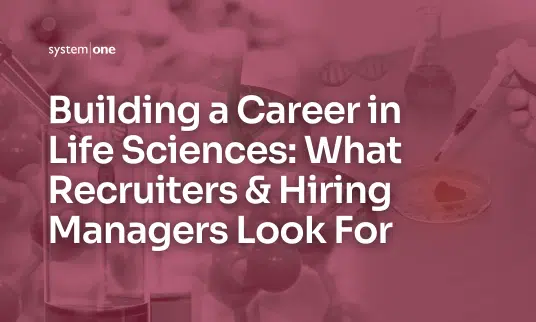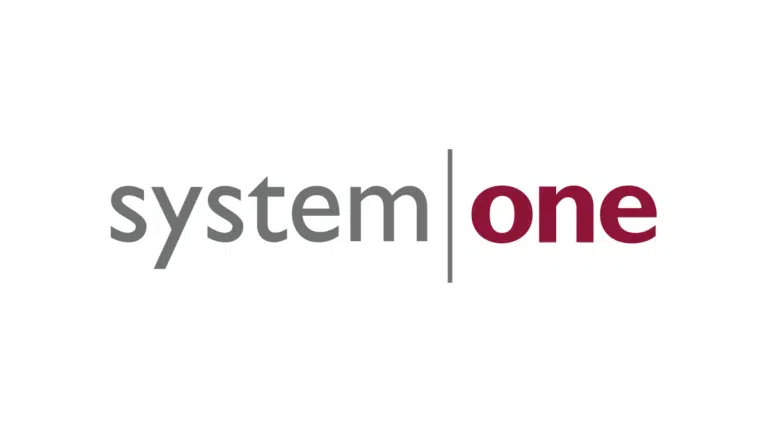Building a Career in Life Sciences

What Recruiters & Hiring Managers Look For
As the life sciences industry thrives, reaching a record 2.1 million jobs last year (Despite Slowdown, Life Science is Still Poised for Long Term Growth), the demand for skilled professionals has increased, making it essential to gain a competitive edge. System One relies heavily on our life sciences subsidiary brand, Joulé, to recruit the best and brightest life science candidates on the market. With 30 years of being a trusted partner to the industry's leading clinical, scientific, and healthcare organizations, our experienced Joulé recruiters have exclusive relationships with top life science organizations, so they know exactly what hiring managers are looking for.
We asked our recruiters what they look for in candidates, and here were some of the answers we received:
When searching for the ideal candidate, we focus not only on finding someone with the right skill set but also on identifying someone passionate about their work and eager to make a meaningful impact.
- Megan Sacks, Senior Recruiter
On the hard skills side, we value technical expertise, problem-solving abilities, and mastery of tools or systems that show you're ready to deliver results. Combine that with a strong first impression—like confidence, professionalism, and a genuine enthusiasm for the role—and you'll be sure to stand out from the crowd!
- Meghan Downey, Senior Lead Recruiter
When speaking with candidates, it is important to listen for a few things. One of the most important to me is their love and passion for the clinical research industry. I ask them to speak about their daily responsibilities and while in conversation, I learn not only what they are doing but also how important they feel their work is to them and the trial they are supporting.
- Eileen Leek, Lead Recruiter
I look for can-do attitudes and positive perspectives. When they can easily list positive areas of work, environment, and responsibilities, I feel that says a lot about their perspective not only on work but life too, because it translates across areas of functioning.
- Ligia E. Mejia, Senior Recruiter
I am looking for their ability to clearly convey their experience, with a clear and concise overview and a few examples of their hands-on experience with techniques, instrumentation, and software. I am also looking for candidates who are articulate and don't use filler words, who ask their own questions, which shows their level of interest in the role, and also conveys enthusiasm and excitement in their voice. I know they will do extremely well in an interview if they convey their passion for what they do in a 15-minute phone call.
- Colleen Losiewicz, Recruiting Manager
After gathering insights from our recruiters, we've compiled a list of the top skills every Life Science candidate should possess. Here's what stands out:
Technical and Hard Skills:
- Technical expertise and knowledge of industry-specific tools, techniques, instrumentation, and software. Some examples include PCR (Polymerase Chain Reaction), ELISA (Enzyme-Linked Immunosorbent Assay), cell culture techniques, chromatography, and mass spectrometry.
- Problem-solving abilities to tackle challenges effectively.
- Experience with clinical research responsibilities and trial support.
Communication Skills:
- Ability to clearly and concisely convey experience with specific examples.
- Ability to ask insightful questions, demonstrating curiosity and engagement.
Passion and Enthusiasm:
- A strong passion for the life sciences field and dedication to making an impact.
- Demonstrated enthusiasm for the role and excitement about responsibilities.
Professionalism and First Impressions:
- A confident and professional demeanor during interactions.
- Ability to make a strong first impression with positivity and poise.
Mindset and Attitude:
- A can-do attitude and positive perspective on work and life.
- Ability to highlight positive aspects of their work and responsibilities.
Interpersonal Connection:
- Demonstrated genuine interest in the role through their tone and interaction.
- An ability to make their work feel meaningful, showing its importance to them and the industry.
While hard skills are a must for technical roles within the life sciences industry, soft skills are rarely overlooked by recruiters and hiring managers. In fact, 92% of hiring managers believe soft skills are equally as important as hard skills, and 89% of bad hires typically lack soft skills (Skills Based Hiring Trends & Statistics for 2024). To remain competitive, it's essential to strike a balance to position yourself as a well-rounded candidate ready to make a meaningful impact.
Looking for business solutions?
Explore System One
